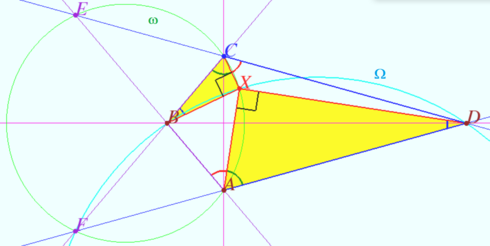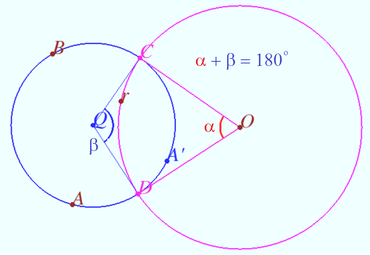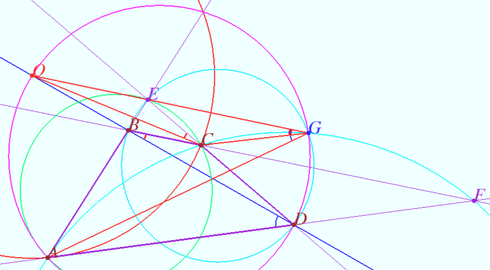2018 IMO Problems/Problem 6
A convex quadrilateral ![]() satisfies
satisfies ![]() Point
Point ![]() lies inside
lies inside
![]() so that
so that
![]() and
and ![]() Prove that
Prove that ![]()
Solution
Special case
We construct point ![]() and prove that
and prove that ![]() coincides with the point
coincides with the point ![]()
Let ![]() and
and ![]()
Let ![]() and
and ![]() be the intersection points of
be the intersection points of ![]() and
and ![]() and
and ![]() and
and ![]() respectively.
respectively.
The points ![]() and
and ![]() are symmetric with respect to the circle
are symmetric with respect to the circle ![]() (Claim 1).
(Claim 1).
The circle ![]() is orthogonal to the circle
is orthogonal to the circle ![]() (Claim 2).
(Claim 2).
Let ![]() be the point of intersection of the circles
be the point of intersection of the circles ![]() and
and ![]() Quadrilateral
Quadrilateral ![]() is cyclic
is cyclic ![]()
![]()
Analogically, quadrangle ![]() is cyclic
is cyclic ![]() .
.
This means that point ![]() coincides with the point
coincides with the point ![]() indicated in the condition.
indicated in the condition.
![]() of
of ![]()
![]() of
of ![]() The sum
The sum ![]() (Claim 3)..
(Claim 3)..
Hence, the sum of the arcs ![]() is
is ![]()
the sum ![]()
Similarly, ![]()
Claim 1 Let ![]() and
and ![]() be arbitrary points on a circle
be arbitrary points on a circle ![]() be the middle perpendicular to the segment
be the middle perpendicular to the segment ![]() Then the straight lines
Then the straight lines ![]() and
and ![]() intersect
intersect ![]() at the points
at the points ![]() and
and ![]() symmetric with respect to
symmetric with respect to ![]()
Claim 2 Let points ![]() and
and ![]() be symmetric with respect to the circle
be symmetric with respect to the circle ![]() Then any circle
Then any circle ![]() passing through these points is orthogonal to
passing through these points is orthogonal to ![]()
Claim 3 The sum of the arcs between the points of intersection of two perpendicular circles is ![]() In the figure they are a blue and red arcs
In the figure they are a blue and red arcs ![]()
Common case
Denote by ![]() the intersection point of the midpoint perpendicular of the segment
the intersection point of the midpoint perpendicular of the segment ![]() and the line
and the line ![]() Let
Let ![]() be a circle (red) with center
be a circle (red) with center ![]() and radius
and radius ![]()
The points ![]() and
and ![]() are symmetric with respect to the circle
are symmetric with respect to the circle ![]() (Claim 1).
(Claim 1).
The circles ![]() and
and ![]() are orthogonal to the circle
are orthogonal to the circle ![]() (Claim 2).
(Claim 2).
Circles ![]() and
and ![]() are symmetric with respect to the circle
are symmetric with respect to the circle ![]() (Lemma).
(Lemma).












